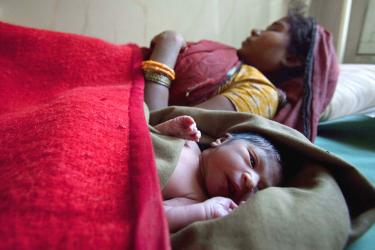(Our Mother's Day 母親節 Series Part 5: Postnatal 產後 Yoga)
Chen Tsai-chuan, director of gynecology at Greater Taichung’s Lin Shin Hospital, says the belief that postpartum mothers must avoid showering or washing their hair to avoid catching a cold is not wrong, but advances in technology mean that we now have hair dryers and heaters, so there is not much risk of catching a cold if the postpartum mother dries her hair immediately after showering and stays warm.
Gender specialist Huang Rui-ru says that gender-related problems often have to do with communication and living habits. She says some new mothers suffer postpartum depression because they feel scared about having to fill so many roles at once. Huang says that friends of new mothers, as well as the families of the husband and wife, should show more concern for them.
Mothers-in-law might insist that their postpartum daughters-in-law follow traditional postnatal confinement norms out of concern for them, but when miscommunication occurs it can easily make a person feel burdened instead of loved.
Huang says that people should adjust their way of thinking to keep pace with the times, adding that many central air conditioning systems are excellent nowadays, so using air conditioning will not adversely affect a postpartum mother. She also says people should not get divorced simply because they have different views regarding postnatal confinement, because it is not a good thing for a child to be brought into this world only to be separated from its parents.
(Liberty Times, Translated by Kyle Jeffcoat)
坐月子有沒有禁忌要遵守?婦產科醫生認為,隨著時代進步,現代產婦應可以較輕鬆方式坐月子,不一定要照古例。
台中市林新醫院婦產科主任陳財泉表示,產婦不能洗澡、洗頭,是為了避免遭受風寒,這個觀念沒錯,但隨著科技進步,目前已有吹風機及暖氣等設備,只要洗澡及洗頭後立刻吹乾,並隨時保暖,基本上並沒有受風寒的問題。
性別專家黃瑞汝表示,兩性問題,很多原因在於溝通及生活習慣,這名產婦可能有產後憂鬱症,因為角色多重,會有恐懼感,夫家、娘家及朋友應多一點關懷。
而婆婆可能也因疼惜媳婦產後身體,才要求以傳統方式坐月子,但若溝通方式不對,讓人感受不到善意,愛就會變成負擔、包袱。
黃瑞汝建議民眾,時代在變,觀念要與時俱進,現今很多中央空調設施很好,吹冷氣對產婦身體並不會有後遺症,不必為坐月子觀念不同就離婚,讓孩子一出生就無法與父母在一起,這樣對孩子並沒有好處。
(自由時報記者蘇金鳳、蔡淑媛、林良哲)
No comments:
Post a Comment